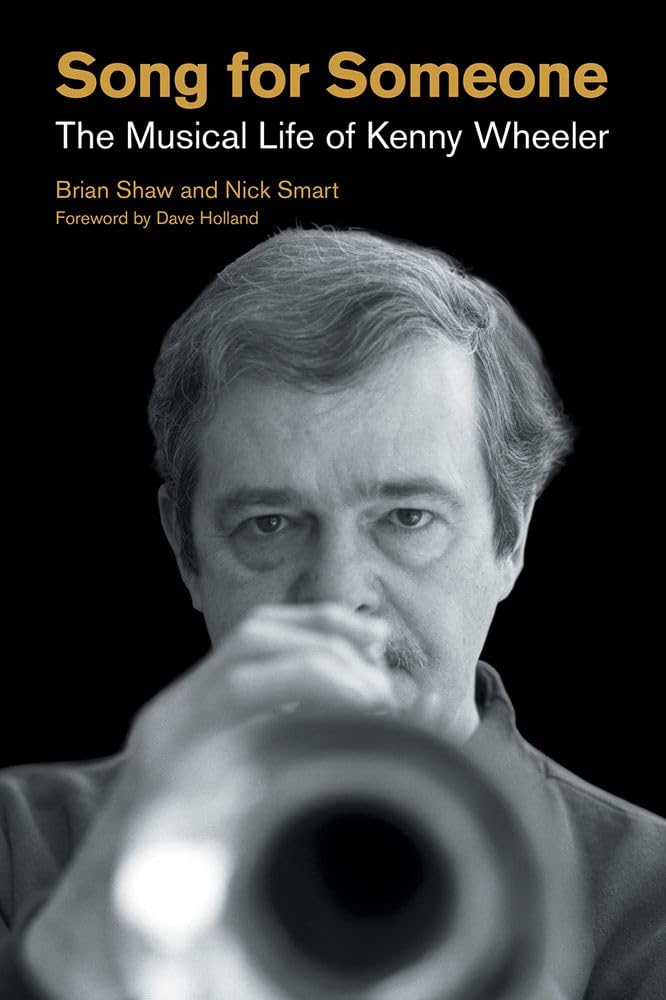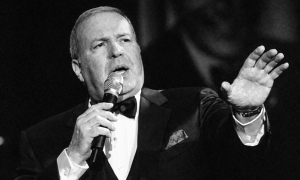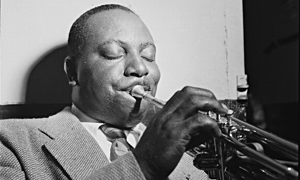Home » Jazz Articles » Book Review » Song For Someone The Musical Life of Kenny Wheeler
Song For Someone The Musical Life of Kenny Wheeler
Song For Someone is a ground-breaking account of a major jazz figure whose importance will continue to grow as his achievements are further recognized.
 Song For Someone The Musical Life of Kenny Wheeler
Song For Someone The Musical Life of Kenny Wheeler Brian Shaw and Nick Smart (Foreword by Dave Holland )
509 Pages
ISBN: # ISBN-13- 978-178179
Equinox Publishing
Prising apart the complex nature of Kenny Wheeler is a worthwhile task. Wheeler lacked swagger, a swashbuckling attitude and arrogance. He said, "I don't say much and when I do, I don't say much." He was a quiet man but when he played, and composed, his reticence fell away to reveal, beauty, integrity and blazing talent.
Brian Shaw and Nick Smart's biography, Song For Someone: The Musical Life of Kenny Wheeler, looks at the life and career of the unique and multi- talented jazz musician Kenny Wheeler. The book, with a foreword by Dave Holland, explores Wheeler's wide-ranging contributions as both a player and composer, highlighting his ability to bridge the gap between free improvisation and mainstream jazz. Wheeler possessed a serene and lyrical sound on trumpet and flugelhorn.
Kenny Wheeler constantly denigrated his own abilities so that the jazz world, for a time, mistakenly viewed Wheeler at his own estimate. To get to the heart of this wonderful, talented man involves cutting through the shyness and self-doubt to reach the essence of Wheeler as Brian Shaw and Nick Smart have done in the biography.
Arriving in London from Canada in 1952 when he was 22, Wheeler's early days in London revolved around Archer Street and Great Windmill Street in Soho, where musicians gathered to find work. He played with various bands, including those of Roy Fox, Carl Barriteau, Tommy Whittle, and Don Rendell, and even spent time at a Butlin's holiday camp with Buddy Featherstonhaugh. A significant period in his development was his six-year tenure (1959-1965) with John Dankworth's orchestra. During this time, he also studied composition with Richard Rodney Bennett and Bill Russo, honing his skills as a composer and arranger. Dankworth recognized Wheeler's talent and commissioned him to write music for an LP, resulting in Windmill Tilter, a suite inspired by Cervantes' Don Quixote. The writing of the album was a precursor of future work. In addition, yearly BBC broadcasts enabled Wheeler to experiment with music for larger groups.
In 1966, Wheeler discovered and explored the growing free music scene at London's Little Theatre Club, meeting John Stevens, Evan Parker, and Derek Bailey. This led to a period where Wheeler was involved in both structured music with the Dankworth band and free music with the Spontaneous Music Ensemble (SME). He moved easily between the two worlds.
The authors of the book describe the impact of Booker Little on Wheeler. The Eric Dolphy album Out Front, particularly Booker Little's trumpet playing, profoundly affected Wheeler, showing him a way to be different while still adhering to tradition. For Wheeler this resolved some inner conflicts. He did not feel confident playing bebop which he loved but he did not feel it was a path that he could follow.
Shaw and Smart stress the importance of the relationship with Manfred Eicher, the founder of ECM. A meeting with Eicher and Wheeler in 1970 led to a fruitful collaboration. Eicher invited Wheeler to New York in 1975 to record Gnu High, featuring Keith Jarrett, Dave Holland, and Jack DeJohnette. This album brought Wheeler international recognition and established his distinctive approach to composition and improvisation. The book portrays Eicher as a powerful dominating figure, initially inspiring awe in musicians, but also capable of humanity,
The picture that emerges was of musicians anxious not to upset Eicher, not to jeopardise their contracts. When Wheeler was recording with George Adams, George launched into one of his blues numbers. Instantly, most musicians present were extremely worried about how Eicher would react to such non-ECM music. There were glances over the control room to see how Eicher would react. There was relief when Eicher accepted the music and eventually included the blues in the next album Sound Suggestions.
Wheeler's discography on ECM includes several celebrated albums, such as: Gnu High (1975): his ECM debut, featuring Keith Jarrett, Dave Holland, and Jack DeJohnette, showcasing his blend of lyrical melodies and sophisticated harmonies. Deer Wan (1977) had further exploration of spacious, melancholic compositions that became a hallmark of his style. Double, Double You (1984): featured a strong lineup including Michael Brecker and John Taylor. Music for Large and Small Ensembles (1990): was considered one of his masterpieces, highlighting his skill in writing for expanded instrumental configurations.
Wheeler collaborated with numerous jazz ensembles and groups, including the Anthony Braxton Quartet, Azimuth (with John Taylor and Norma Winstone), and the Dave Holland Quintet. He also worked with the United Jazz and Rock Ensemble, The George Gruntz Concert Jazz Band, and The Globe Unity Orchestra.
The Banff Centre for the Arts in Canada played a significant role in his career, providing opportunities to teach and collaborate with other prominent jazz musicians. His influence on a generation of musicians who attended workshops there during the 1980s and 1990s was considerable.
Later in his career, Wheeler engaged an Italian management company, which led to a temporary break with ECM. He recorded eight albums with the Italian recording company CAM Jazz , allowing him to release new projects on a yearly basis rather like his association with the BBC in his early years.
After the relationship with CAM ended, Eicher and ECM returned to record Kenny Wheeler's last album, Songs for Quintet (2013). The book movingly recounts the recording of this album, with a frail Wheeler completing the project with the help of friends.
The biography has comprehensive notes but it lacks a full index, which would be useful for locating specific compositions within the text. However, this does not detract from the book's overall quality as a superb, beautifully researched and written account of a complex and gifted jazz artist.
The writers emphasise how important it was for Wheeler to have the esteem from his fellow musicians: Dave Holland, John Taylor, Norma Winstone, Duncan Lamont, Stan Sulzmann, Chris Laurence, Henry Lowther and Evan Parker. Co-author of the biography, Nick Smart, head of Jazz at the Royal Academy in London was described as Kenny's de-facto manager at the time of the final recording.
Doreen Wheeler, Kenny's wife, is the unobtrusive centre of the book and it is rightly dedicated to her. I can't remember an account of a jazz musician's life that gave so much credit to his wife.
Finally, Darcy James Argue, a fellow band leader and Canadian said about Kenny Wheeler. "I don't think there's any question that he belongs in the pantheon of greats, both as a player and as a composer. But what I find most inspiring about Kenny is the way he embodied a wide-open, all-embracing approach to making music. At a time when there was a fierce and highly partisan rift between the improv scene and the mainstream jazz world, Kenny showed everyone how to bridge the divide. He has said that when he was playing straight-ahead jazz, he would try to play free, and when he was playing free, he would try to play melodically—he considered them complimentary. His ability to draw from both is essential to his sound. If today that view seems to have acquired a bit more currency, it's in part because Kenny Wheeler, and musicians inspired by him, helped to make it so."
Song For Someone is a ground-breaking account of a major jazz figure whose importance will continue to grow as his achievements are further recognized.
Tags
Book Review
Jack Kenny
Dave Holland
Roy Fox
Carl Barriteau
Tommy Whittle
Don R
Richard Rodney Bennett
Bill Russo
John Stevens
evan parker
Derek Bailey
Booker Little
Eric Dolphy
Manfred Eicher
Keith Jarrett
Jack DeJohnette
George Adams
Michael Brecker
John Taylor
anthony braxton
norma winstone
George Gruntz
Duncan Lamont
Stan Sulzmann
hris Laurence
Henry Lowther
Darcy James Argue
Equinox Publishing
John Dankworth
PREVIOUS / NEXT
Support All About Jazz
 All About Jazz has been a pillar of jazz since 1995, championing it as an art form and, more importantly, supporting the musicians who make it. Our enduring commitment has made "AAJ" one of the most culturally important websites of its kind, read by hundreds of thousands of fans, musicians and industry figures every month.
All About Jazz has been a pillar of jazz since 1995, championing it as an art form and, more importantly, supporting the musicians who make it. Our enduring commitment has made "AAJ" one of the most culturally important websites of its kind, read by hundreds of thousands of fans, musicians and industry figures every month.























